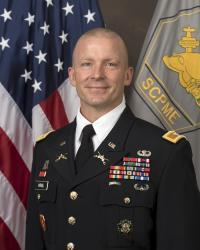SPIA can count thousands of changemakers among its alumni, but a few are exemplars of service, leadership, and humanity on an international scale. Colonel Scott Virgil (MA’08) fits that description. Col. Virgil has served as an officer in the U.S. Army since 1998, upon his graduation from the United States Military Academy at West Point, where he now directs the Simon Center for Professional Military Ethic. He was deployed to Kosovo and commanded in Afghanistan as part of Operation Enduring Freedom.
“He has served his country in so many ways,” said Dr. Audrey Haynes, who served as the graduate coordinator in 2007, during Col. Virgil’s time in the UGA Department of Political Science. “He risked his life and limb in multiple tours and has always been recognized for the care in which he leads others and the intelligence of his leadership.”
 Virgil, like many mid-career armed service officers, was offered the opportunity to attend graduate school, in a field of his choice. His wife had family in Georgia, and the combination of geographic location, a traditional college atmosphere, and the prestige of the political science department and its scholars made UGA an easy choice.
Virgil, like many mid-career armed service officers, was offered the opportunity to attend graduate school, in a field of his choice. His wife had family in Georgia, and the combination of geographic location, a traditional college atmosphere, and the prestige of the political science department and its scholars made UGA an easy choice.
“[In 2007-2008,] the Army was encountering a lot of issues and a lot of environments that we weren’t necessarily prepared for, that required much more critical thinking at the strategic level. Previously, if you were a younger officer and you exceled at the tactical level, that would be enough. We [now] needed officers that had broader experiences and skills, and that was what I was looking for at UGA.”
Beyond critical thinking, statistical analysis, and rigorous content in political science and international relations, Col. Virgil sought to grow in empathy, a leadership characteristic considered key in today’s Army. “I really valued intellectual interactions with undergraduate and graduate students who had no association with the military,” shared Virgil. “It was a rough time [during the wars in Afghanistan and Iraq]. After a [student-organized protest], I approached them and had intellectual discussions in a very enjoyable way,” he said.
Other high points included courses with Drs. Bullock and Grafstein, and, most memorably, a transformative independent study course with Dr. Loch Johnson. The project focused on ensuring and enhancing national intelligence oversight. “In the military, we were trying to wrap our heads around it. I had been taught about the rules of engagement, but wanted more understanding of [appropriate oversight of] enhanced interrogation techniques, and that’s what I got from Dr. Johnson.”
“Through my undergraduate degree, I did what I felt I should be doing. When I came to UGA I had more of a feeling of doing what I wanted to be doing.”
The concept of empathy emerges again and again, especially in anecdotes connecting global security and a sincere, elemental human appreciation. “In one of my deployments, we were providing security for one of the Afghan elections. We watched this one family walk, it had to be 10 miles. One horse, one mule, and a family. The elders walked 10 miles just to vote.”
Upon completion of the degree, Colonel Virgil re-deployed across the globe, eventually landing in Washington, D.C., where he served at the Pentagon as a special assistant to the Vice Chief of Staff of the Army. He joined the faculty at West Point in 2019, as director of a unit responsible for instilling character education and developing leadership skills, in a culture complicated by social media, diverse role models, and, now, the challenges of remote learning.
“I really can’t say enough about how proud I am . . . knowing that he is a part of our country’s military leadership, particularly in that he helps teach this next generation what leadership really is all about,” said Haynes.
His lesson for young officers, beyond an adherence to empathy and integrity, involves following their hearts as they chart an academic and professional path. “Let your passion guide, in study or job. If you do something you aren’t interested in, it will never play out right. . . As in work/home life, it’s never a balance. Rather, the term I like to use is `harmony,’ [in your] academic and professional life and the rest of the community.”
Colonel Virgil found harmony in the UGA community, and now works to help young officers achieve the same levels of purpose and passion.
“He cares so much for the institutions and the people he is sworn to protect,” said Haynes. “He is simply a role model for us all.”
